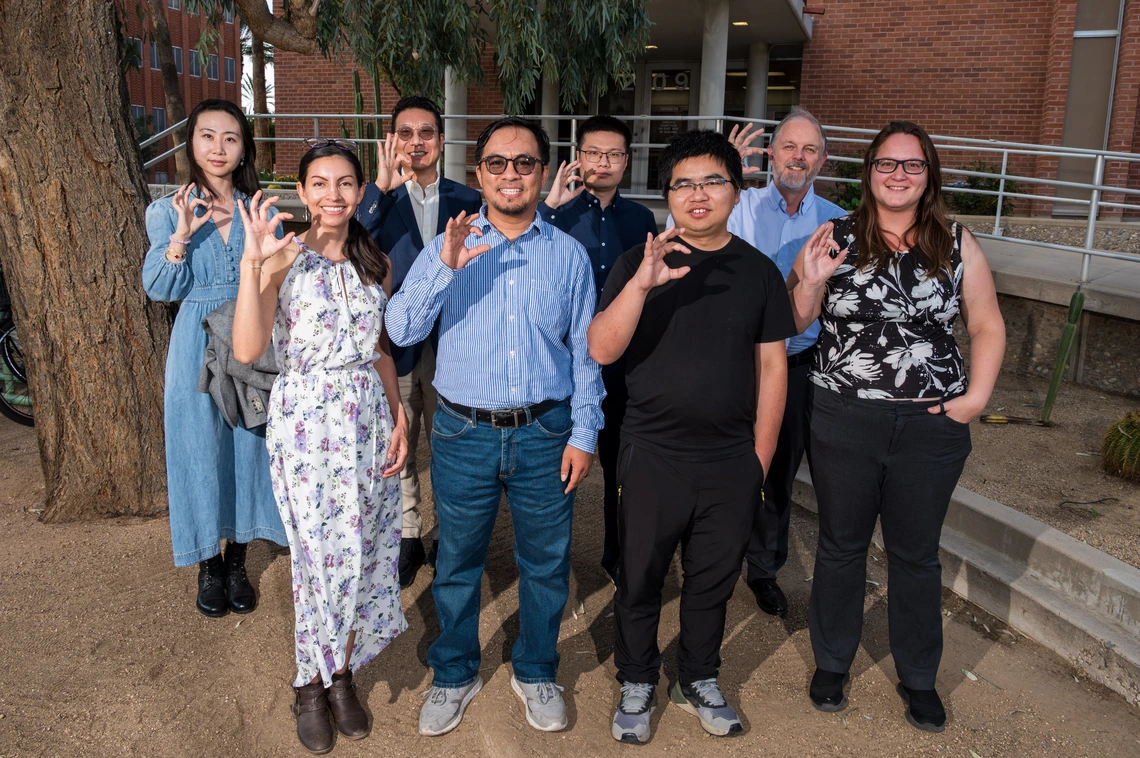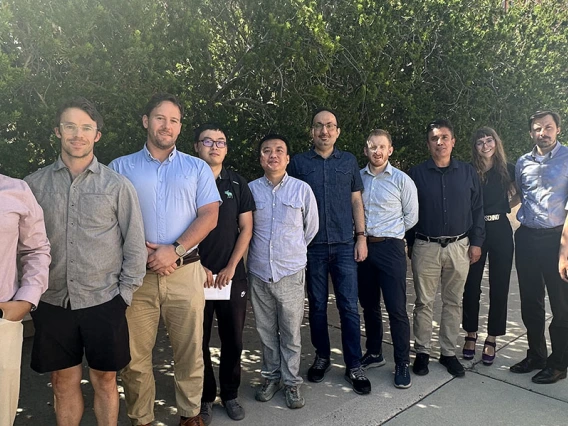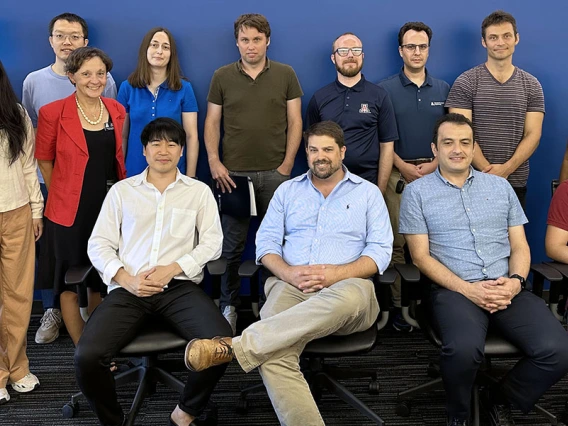11 faculty join Engineering to grow computer science, mining programs
Incoming class includes the university’s first chief AI officer, David Ebert.

Incoming College of Engineering faculty members bring expertise in specialties ranging from artificial intelligence and data science to mine design.
Among the University of Arizona College of Engineering’s 11 newest faculty members are seven in the Department of Electrical and Computer Engineering, including David Ebert, the university’s first chief AI and data science officer. He advises the computer science and engineering program. The School of Mining Engineering and Mineral Resources hired three in 2025, and the Interdisciplinary Capstone program one.
All have at least one goal in common: Prepare students to excel in today’s workforce.
“They will grow our computer science and engineering specialization, advance applied quantum networking research, and prepare students for careers in all engineering fields, including a much-needed mining workforce,” said Kathleen Melde, associate dean of faculty affairs and inclusion.
INTERDISCIPLINARY CAPSTONE PROGRAM
Fighter pilot mentors design teams
Col. Carey Jones, assistant professor of practice in academic affairs, mentors senior design teams as part of the Interdisciplinary Capstone program. She is dedicated to doing for Engineering seniors what mentors did for her throughout three decades of service in the U.S. Air Force – as a fighter pilot, strategist and educator.
“Throughout my military career, they helped me focus on the right objectives and gave me the tools to overcome significant challenges,” said the highly decorated officer.
Jones, who did graduate work in aerodynamics and meteorology, has two military master’s degrees – in military operational art and science and in strategic studies (grand strategy).
ELECTRICAL AND COMPUTER ENGINEERING
Multi-agent specialist leads research group
Assistant professor Jingdi Chen directs ECE’s ANNIE (Agents, Novelty, Nurturing, Incentives, Exploration) Research Group. The group designs intelligent, efficient and interpretable multi-agent systems for collaborative, secure and fair decision-making.
“My research focuses on areas such as reinforcement learning, fairness, network optimization, cybersecurity and explainable AI,” said Chen.
Her work has been published in NeurIPS, the Association for the Advancement of Artificial Intelligence, MobiHoc and IEEE Transactions, and she has collaborated with partners such as Nokia Bell Labs and the U.S. Military Academy.
Chen has a PhD in electrical and computer engineering and an MS in statistics from The George Washington University and was a postdoctoral researcher at Carnegie Mellon University.
Collaboration central for computer scientist
“Higher education is not only about disseminating knowledge but also about shaping future professionals who contribute to society,” said Diana Diazh, associate professor of practice.
Diazh is dedicated to getting students involved in research and mentoring them toward making a difference in the world. Previously, she was associate professor of practice in the U of A Department of Computer Science.
She earned a 2021-2022 College of Engineering Teaching Award from the University of Illinois, Chicago, and contributed to 23 publications. She has a master's and doctorate in computer science from Wayne State University and a master’s in computer systems engineering from The Andes University in Colombia.
University’s chief AI officer advises CSE
David Ebert, chief AI and data science officer, is an associate vice president in the university’s Office of Research and Partnerships and the inaugural Computer Science and Engineering Endowed Innovation Chair in ECE.
“I am excited to help create an innovative program to evolve education, research and applications to be at the forefront of the field and position our graduates and faculty for future opportunities,” said Ebert.
A U of A alum with a doctorate in electrical and computer engineering, Ebert has more than 30 years of experience in artificial intelligence, explainable AI, data science, visual analytics and human-computer teaming. He is an IEEE fellow and received the organization’s Society VGTC Technical Achievement Award.
Optical engineer develops quantum networks
U of A alum Shelbi Jenkins joined ECE as an assistant professor following work in the private sector as an optical engineer. She specializes in the design of photonic devices and analytical models that advance quantum networks.
Her work appears in IEEE JSAC, Optics Continuum, and Chemistry of Materials, and she holds a U.S. patent for a magneto-optic magnetometer.
Among awards she has received is the 2020 Mary Jo Lake Memorial Fellowship in Optical Sciences. Jenkins earned a PhD and MS in optical sciences from the James C. Wyant College of Optical Sciences and a BA in Physics from Willamette University.
Assistant professor aims for AI trustworthiness
Assistant professor Xiaolong Ma joined the U of A from Clemson University, where he was an assistant professor in the Department of Electrical and Computer Engineering.
He has published more than 50 papers on AI, deep learning, computer vision, and edge computing, with a focus on making AI faster and more energy efficient. NSF and NASA support his research, totaling more than $2.5 million in funding.
Ma, who earned a PhD in computer engineering from Northeastern University, is particularly interested in exploring when learning is possible and characterizing the fundamental limits of learnability across a wide range of settings.
Theorist appreciates departmental alignment
Assistant professor Changlong Wu, who previously served as a visiting assistant professor at Purdue University and a postdoctoral research associate at the NSF Center for Science of Information, said he was impressed by the college’s investment in computer science and engineering.
“Since my research lies at the intersection of AI theory and information theory, I felt this department was a great match for my work and an exciting opportunity to grow alongside the college’s initiatives,” said Wu, who holds a doctorate in electrical engineering from the University of Hawaii at Mānoa.
He has published about 25 papers exploring information theory and machine learning.
Cyberphysical protector prizes mentor role
Assistant professor Qingzhao Zhang combines software analysis, AI security and network design to improve safety and reliability of cyberphysical systems – technology that links computers to the physical world, such as in autonomous vehicles and industrial control systems.
Zhang, who has mentored more than 10 undergraduate and graduate students while steering multiple research projects, is invested in the growth of his students.
Google, Cisco and General Motors are among the companies with which Zhang has worked. He earned a PhD in computer science and engineering and an MS in computer science from the University of Michigan, Ann Arbor.
SCHOOL OF MINING ENGINEERING AND MINERAL RESOURCES
Rock mechanic advances safety
Assistant professor Bo Hyun Kim has 28 years of experience in surface and underground rock mechanics and ground control. Among awards he has received is the Society for Mining, Metallurgy and Exploration Rock Mechanics Award. He has worked with the NIOSH/CDC Spokane Mining Research Division, Itasca Consulting Group, MIRARCO Geomechanics Research Centre, and Korea Resources Corp.
The university’s status as a world leader in mining and the San Xavier Underground Mining Laboratory were among factors that drew him out of the cold.
“After years in places like Canada and Minnesota… the mining heritage and desert setting sealed the deal,” he said.
Kim has authored and co-authored more than 120 publications and earned a doctorate in rock mechanics from Chonnam National University in South Korea.
Professional imparts real-world knowledge
“My goal is to integrate practical, hands-on experiences with rigorous academic training, while fostering interdisciplinary collaboration and engagement with industry,” said assistant professor of practice Samuel Lolon.
Lolon has more than 13 years of experience in strategic mine planning, underground design and ventilation modeling. He has worked on international projects with Freeport-McMoRan, Deswik and Golder Associates.
“Having worked in the industry here in Arizona, I recognize the state’s unique position as a hub for mining,” said Lolon, who earned a PhD in mining and earth systems engineering from the Colorado School of Mines. “The university is strategically placed to make a meaningful impact on both the industry and the broader community.”
Alum shifts focus to student success
For more than 25 years, Edward C. Wellman, associate professor of practice, has led global projects in rock mechanics, slope stability, underground mining and geotechnical analysis.
“I have met Arizona Engineering alumni in every corner of the world. I look forward to expanding those connections,” he said. “I enjoy watching students come together to solve difficult problems and helping them make connections that lead to internships and career opportunities.”
Wellman earned his doctorate in mining and geological engineering from the U of A. He has contributed to more than 15 peer-reviewed publications, including his first co-authored paper that documented the inaugural rover mission to Mars.



